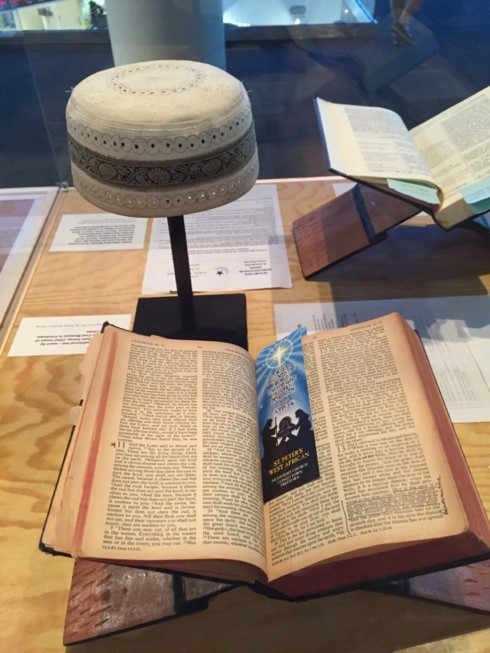Spring/Summer 2020, Issue 2, pp. 13–14
[Online 27 May 2020, Article A011]
[PDF]
Ebola and COVID-19:
Lessons from and for the Faith Community
Ellen Idler,[1] John Blevins,[2] and Mimi Kiser[3]
A not-so-distant mirror of the current pandemic is provided by the 2014-2015 West African Ebola outbreak. We the public now have an easy way to inspect this Ebola mirror and ponder its lessons. As of Thursday February 6, 2020, the Centers for Disease Control and Prevention (CDC) has launched an online digital version of its acclaimed Ebola outbreak exhibit, previously on physical display in the CDC’s David Sencer Museum in Atlanta during 2017 and 2018. The digital project, a joint effort of the CDC with students, faculty, and staff of Georgia State University and Emory University, has catalogued every object and installation in the original exhibit, and includes additional materials such as interviews with actors in the medical, public health, and faith communities of Liberia, Sierra Leone, and Guinea. You can access the digital exhibit here: http://cdcmuseum.org/
At the February digital launch event, one of the CDC scientists who led the Ebola response spoke about her pride in the museum’s exhibit, and how much she had enjoyed giving occasional tours for visitors. She also mentioned that one of her favorite parts of the exhibit was the section about the faith communities that had played such a pivotal role in the epidemic. At the start of the epidemic, funerals for those who had died of the virus were often a serious source of contagion, as relatives and loved ones prepared the body for burial in the traditional way, often with close contact.

Representatives of Islamic and Christian groups responded to burial contagiousness by playing an important role in revising the World Health Organization’s guidelines for “safe and dignified” burials that would be acceptable to bereaved families who needed to honor their dead, and at the same time to be safe. Revising the guidelines was a first step, but getting the message to individual imams and pastors throughout the affected countries was an additional challenge. In Sierra Leone, a national faith-based organization called Focus 1000 met this challenge. Founded by Mohammad Jalloh, a pediatrician who had worked for a number of years with the World Health Organization, Focus 1000 had already established local groups of Christian and Muslim faithful in every district in Sierra Leone before the outbreak. These groups—the Islamic Action Group (ISLAG) and the Christian Action Group (CHRISTAG)—disseminated the guidance developed by the Inter-religious Council of Sierra Leone to local communities. In a two-day meeting, leaders from the Inter-religious Council searched the Quran and the Bible for teachings that would be relevant to a time of epidemic. The CDC exhibit displayed one of the Qurans and one of the Bibles that had been used by the religious leaders at the meeting, complete with post-it notes and handwriting in the margins. (One is able to see, for instance, the word “quarantine” written beside an underlined text, visible in the photo and also on the CDC site). Those passages became the basis for sermons, khutbahs, and lessons that could be distributed to all faith communities, from national to regional to local mosques or churches. The interfaith meeting took place in late 2014, at the very peak of the epidemic, concurrent with the release of the revised guidelines for safe and dignified burials. Three weeks after these events, there was a rapid decline in cases. The faith community’s actions, which in the early stages had been an accelerant for the epidemic, then became an important braking mechanism. You can read more about these events here: https://ajph.aphapublications.org/doi/10.2105/AJPH.2018.304870
Today we are in the midst of another epidemic, this one much closer to home. Once again, religious gatherings and funerals have shown themselves to be sources of transmission of the virus. There has been some tension, covered heavily in the press, between public health messages and religious leaders, some of whom have refused to cease holding large gatherings for services. Fortunately — and despite the wide coverage — this is not what most religious leaders in the US are doing. There is a multifaith Facebook group for clergy that has over 7000 members as of this writing on May 19 and is growing daily. It is filled with messages of encouragement and technical advice for clergy coaching each other on how to use Zoom for Sunday School, or writing liturgies for their online services, and considering ahead of time the funerals they will almost surely have to perform. These clergy are funny, sad, thoughtful, and sincere in their desire to keep their congregants safe – none of them are disregarding the advice of the CDC on physical distancing and handwashing. They are doing their best to promote safe practices. Moreover, they are focused on caring for the needy and vulnerable in their communities and being a source of support to each other. The message of conflict between religion and public health (science) is unfortunately a common narrative, but it’s not the one we should be hearing at this time.
The Interfaith Health Program of Emory University is mounting an extensive web site for resources by and for faith communities, to support their efforts in their congregations and communities. Our main website can be accessed here: http://ihpemory.org/
We welcome submissions! Please use the online submission link below to contribute your “COVID-19 Resources for Faith Communities” documents, web sites, and other materials, which will then be catalogued and posted – we know the readers of this newsletter will have a lot to offer. Just submit a link or document and it will be catalogued and posted after being assessed for the soundness of the content: http://ihpemory.org/covid-19-resource-submission/
[1]^ Ellen Idler, PhD, Department of Sociology, and Director of Religion and Public Health Collaborative, Emory University, Atlanta, GA (eidler@emory.edu).
[2]^ John Blevins, ThD, Rollins School of Public Health, Emory University, Atlanta, GA (jblevin@emory.edu).
[3]^ Mimi Kiser, DMin, MPH, RN, Rollins School of Public Health, Emory University, Atlanta, GA (mkiser@emory.edu).
